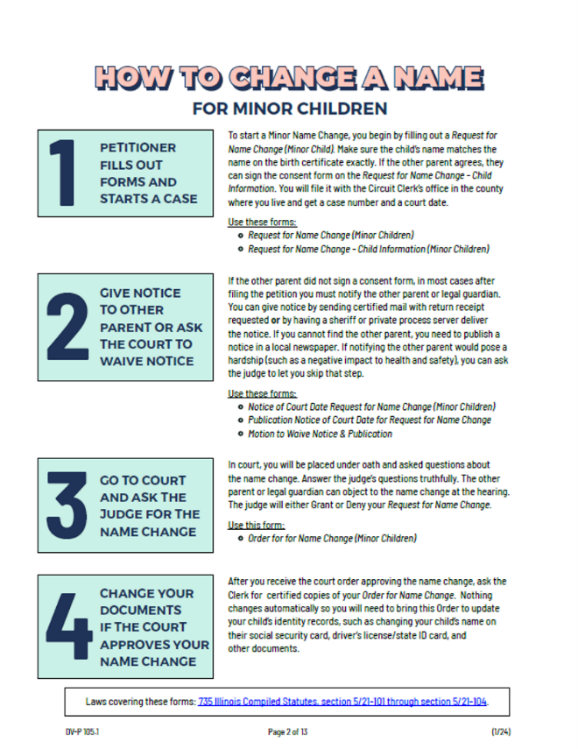Access to the legal name change process is important for ensuring consistency in identification across one’s life, including facilitating access to rights, benefits, and services, as well as allowing individual self-determination.
To better promote access to the legal name change process in Illinois, Public Act 102-1133 amends and repeals components of the name change process, the Illinois Code of Civil Procedure Change of Name
section, the Arsonist Registration Act, the Sex Offender Registration Act, and the Murderer and Violent Offender Against Youth Registration Act.
Effective January 1, 2024, the act removes the lifetime prohibition on name changes for people who must register pursuant to the Arsonist Registration Act, the Sex Offender Registration Act, and the Murderer and Violent Offender Against Youth Registration Act if the name change is due to marriage, religious beliefs, status as a victim of trafficking, or gender-related identity as defined by the Illinois Human Rights Act. It also adds judicial discretion to grant or deny petitions for name changes from people on these registries.
Further, people with felony convictions no longer must wait 10 years to file for a legal name change following the completion of a sentence and can petition the court upon the discharge, completion, or pardoning of a sentence.
The act contains safeguards to promote the legitimate use of the legal name change process.
One such safeguard is that people who must register on the above registries must report their name change to the authorities with whom they must register within 10 days. The circuit clerk must also serve a copy of the name change petition on the State’s Attorney and the Department of State Police for any person who has a felony or misdemeanor conviction that has not been pardoned, or if there is an arrest or pending felony or misdemeanor charge.
Another safeguard is that the State’s Attorney can object within 30 days to any petition from any person who has a pending criminal offense or who has been convicted of identity theft, minor sexual abuse, sexual exploitation, indecent solicitation of a child, or indecent solicitation of an adult.
In addition to these changes, the act also contains several provisions that generally promote access to the legal name change process.
First, the Code of Civil Procedure removed a third-party witness requirement for all name change petitions that the act previously required.
Second, the act addresses challenges posed by the publication requirement for people seeking name changes by allowing people to submit a statement, verified under oath, to request a waiver of the publication requirement if the person believes that publishing notice would present a hardship, including but not limited to, a negative impact on a person’s health or safety. When waiver of publication is sought, the waiver is presumed granted and is heard at the same time as the petition, where judicial discretion is reserved to determine whether a hardship is shown.
Finally, the act directs that an Illinois Supreme Court statewide standardized form shall be used for name change petitions and reflect the abovementioned updates.
In anticipation of the January effective date for the bill, the Illinois Supreme Court Commission on Access to Justice Forms Committee and its Name Change Subcommittee have updated the statewide form based on the new law changes, feedback from court stakeholders and the public, and input from subject matter experts. These new forms are also the first published under a major redesign of the statewide standardized forms.
On January 2nd, the name change forms will be published on the Illinois Courts’ website in the redesigned format. This new format uses colors, icons, and additional white space to make the forms clearer and more approachable. The instructions also include a roadmap to help litigants better understand where they are in the process of their case. Statewide standardized forms must be accepted in all Illinois courts.
These comprehensive changes to law and to the statewide name change forms not only promote access to these important processes, but also promote access to justice within Illinois courts.
